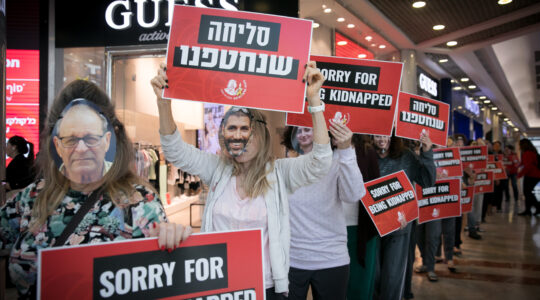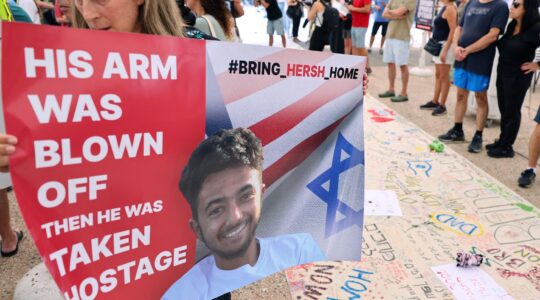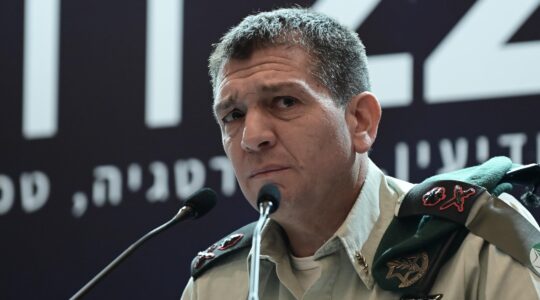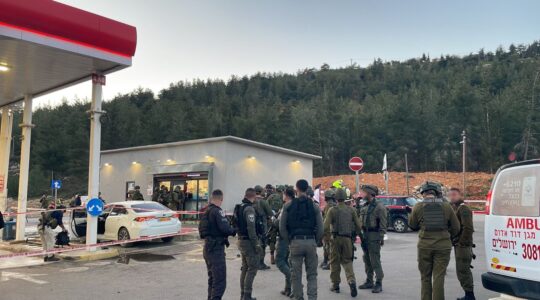ISRAEL VOTES 2009
HERZLIYA, Israel (JTA) — Hamas’ survival of Israel’s recent war in Gaza constitutes de facto Israeli recognition of a militarized Palestinian state on Israel’s doorstep.
Israel is on a collision course with Syria, which is unlikely to sever ties with Iran. If Israel does manage to make peace with Damascus, Bashar Assad’s regime would be in danger of collapse and replacement by an even more radical regime.
Iran’s nuclear program is just a year or two away from weaponization, and even if a military strike on the country’s nuclear facilities is successful, it will only delay, not eliminate, Iran’s ability to get the bomb.
President Obama is likely to be too preoccupied with the economic crisis to stop Iran’s pursuit of nuclear weapons.
These were just some of the grim assessments out of Herzliya, the picturesque Tel Aviv suburb where Israel’s top brass gathers each year to examine, debate and report on the myriad challenges facing the Jewish state.
Scheduled this year for the eve of Israel’s elections, the ninth annual Herzliya Conference, which took place last week at the Herzliya Interdisciplinary Center, provided a sobering look at the problems Israel’s next prime minister will have to confront.
“We cannot ignore the threats around us,” Defense Minister Ehud Barak of the Labor Party said in his presentation, one of three formal addresses at the conference by prime ministerial candidates. “The dove has not returned with an olive branch because the floodwaters have not receded yet.”
By all accounts, the election came at a pivotal moment in Israeli history.
On the Palestinian front, the window of opportunity for a two-state solution is at risk of closing, many analysts warn, with the Palestinian polity increasingly divided and, in Gaza, radicalized. Even if the moderates prevail, the demographic balance between the Mediterranean Sea and Jordan River soon will reach a tipping point where Arabs outnumber Jews. That would open the door for the Palestinians simply to push for a one-man, one-vote, single-state solution that would spell the end of the Jewish state as it is now.
On the Iranian front, the Islamic Republic is likely to acquire a bomb during the next Israeli prime minister’s term unless efforts to arrest the process succeed. Meanwhile, Iran continues to arm and train fighters from Hezbollah, the terrorist militia in southern Lebanon that has an estimated 40,000 rockets pointed at Israel.
Within Israel itself, the next prime minister will take office at a time when public confidence in the institutions of state are at a historic low and calls for fundamental government reform — including changing Israel’s electoral system to make it more stable, less prone to corruption and more representative — are growing.
Then there’s the economic crisis.
All this makes it all the more remarkable that the election campaign appeared to be devoid of substantive debate of the issues. Marked more by sloganeering and attack ads than by real discussion, the campaign produced staggeringly high numbers of undecided voters heading into Election Day.
There are several reasons for the lack of genuine debate. For one, the campaign ran just three weeks, cut short due to the suspension of formal electioneering during Israel’s 22-day operation in Gaza. Second, Israelis were going to the polls to choose a prime minister for the fifth time in 10 years. With their disenchantment of politics running high due to financial and sex scandals that have resulted in the resignations of a prime minister, president, justice minister and finance minister in the past three years alone, Israelis are suffering from election and political fatigue.
It doesn’t help that the candidates for prime minister from Israel’s three largest parties were comprised of two ex-prime ministers whose terms were cut short by no-confidence votes and a former prime minister-designate, Tzipi Livni, who failed to put together a coalition government after winning the Kadima Party primary in September to succeed Ehud Olmert. After her apparent victory Tuesday night, Livni got the chance for a do-over.
The dizzying array of parties running for Knesset — 33 in all — made choosing a party difficult for many Israelis. Among the contenders were two environmental parties, two marijuana legalization parties, two pensioners’ parties and a host of parties with idiosyncratic names and agendas, including the Party of Men’s Family Rights, a party called To Move and one simply called The Israelis.
In the old days, two major parties represented left and right, Labor and Likud, and there were a few small special-interest parties, such as Arab Israeli and Orthodox parties. In the last Knesset, comprised of 120 seats, five parties had double-digit representation. The largest, Kadima, was created just 3 1/2 years ago.
Finally, Israeli voters weren’t altogether clear on the differences between some of the major parties and candidates for prime minister.
Kadima, the centrist party that erstwhile Likud stalwart Ariel Sharon created in November 2005 to advance his plan for unilateral withdrawal from the Gaza Strip, had moved away from the notion of unilateral disengagement. Its leader, Livni, had become Israel’s most visible proponent of negotiations with the Palestinian Authority.
She tried to cast the election as a choice between peace and war. “Israel must, as she has in the past, combine military might with diplomatic initiative,” Livni said in her address Feb. 2 at the Herzliya Conference. But, she added, he who thinks Israel can have “security without some kind of peace process is fooling himself, fooling the public and doesn’t understand the world we live in.”
Meanwhile, the leader of Labor, the one-time standard-bearer of the left, built his campaign around his able prosecution of the recent war in Gaza.
Benjamin Netanyahu, head of the standard-bearer party of the right, Likud, saw himself outflanked during the campaign by Yisrael Beiteinu’s Avigdor Lieberman, whose criticism of the shortcomings of the Gaza operation and hawkish rhetoric against Israel’s own Arab minority won him the support of disenchanted right-wingers.
“On this day our country stands before a choice on its future,” Netanyahu said at the Herzliya Conference: to “end its era of weakness and begin its era of strengthening.”
“Hope,” he said, “stems from recognizing what is happening.”





